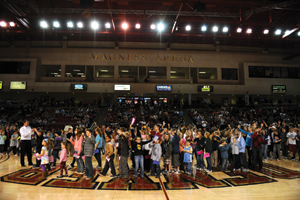Denver is a sprawling metropolitan city home to more than 2.5 million people. As evidenced by lengthy sellout streaks for local professional teams, the residents of Denver and the surrounding areas have demonstrated a historical propensity to loyally support the city’s athletic teams. Paradoxically, however, the Division I university bearing the city’s name has consistently struggled to draw fans for men’s basketball games despite boasting a beautiful arena in a convenient location.
Several challenges were apparent when this problem was first addressed. First, the University of Denver Pioneers men’s basketball team, while improving, was a traditionally marginal Division I product. Denver’s membership in the Sun Belt Conference also meant a conference schedule filled with teams in Southeastern states that, despite their successes, have small alumni bases and followings in Colorado. Moreover, DU has historically been dwarfed by the presence of professional sports and larger universities in the area. Finally, the university has widely been known as a hockey school due to its national championship tradition on the ice. While it is certainly a source of pride for the institution, the success of hockey has also commanded a great majority of the attention given to DU athletics.
Despite these difficulties, emphasis was placed on growth of the men’s basketball program because of the tremendous exposure a successful team can give the institution. In spite of the challenges, DU has potential because of its position in the middle of one of the largest cities in the country. The solution quickly became obvious: Embracing the surrounding communities was the key to realizing the athletic department’s potential.
 |
COURTESY OF UNIVERSITY OF DENVER
One new program recognizing elementary pupils attracted more than 10,000 additional fans. |
The Denver market is saturated with nonprofit entities of various sizes and missions. The national success and recognition of the American Cancer Society’s Suits and Sneakers initiative is evidence of these organizations’ tremendous potential as partners. Therefore, the university developed a program around Denver basketball and built relationships with nearly 30 nonprofits, which later became participants.
Each organization was designated a certain basketball game during the 2010-11 season for which it would promote ticket sales to its extensive contact databases. Half of all ticket revenue it generated was then given back to the organization. DU also positioned each organization to gain exposure during its game. Each nonprofit was allowed to select several outstanding supporters to receive game balls in front of the crowd. In addition, each nonprofit was given a table on the concourse to promote its cause. Finally, each organization was welcomed with a public address announcement and given the opportunity to play a video PSA on the scoreboard. The program’s foundational year was extremely encouraging, for these efforts contributed to an increase in attendance and enhanced good will throughout the Denver area.
 |
With designs of fostering a younger faction of fans, the university worked with a number of large school districts to implement a new initiative, Denver’s Rising Stars. Each elementary school within DU’s partner school districts was asked to select “rising stars” based on academic aptitude and character. Each child was then given a small number of tickets to bring family and friends to a game at which they would be recognized. The ensuing response was overwhelming. Over the course of the season, the Rising Stars program attracted more than 10,000 additional fans to the arena, a number of whom came from out of state to enjoy the event.
While most tickets used in the Rising Stars program were complimentary, it provided a reason and opportunity for thousands of people to attend a Denver basketball game for the first time. The program helped cultivate thousands of new fans and has since attracted the attention of companies interested in corporate sponsorship of the initiative. Like Rising Stars, the Study for Swishes program was also designed to use Denver basketball as an incentive to achieve academic excellence. Students at four elementary schools were rewarded for academic performance with free T-shirts that admitted the wearer into DU basketball games.
External efforts also focused on young alumni though networking receptions before basketball games. And local companies that hired DU students in the last three years were hosted at a game of their choice. Including these groups attracted a substantial number of first-time fans while also conveying the university’s appreciation for their involvement.
With such comprehensive efforts to engage the external community, DU also believed a significant emphasis must be placed on expanding relationships within the campus community. Basketball games were used as a forum to highlight the outstanding accomplishments of university faculty, specifically through the Academic Spotlight game ball presentation. In addition, both the Daniels College of Business and Sturm College of Law enhanced their partnerships with the athletic department. The Daniels College hosted an event in conjunction with a game that was attended by more than 400 of its supporters. Similarly, the Student Bar Association and law school held networking receptions for students during four games. These receptions were well-received and will be expanded in coming years.
Largely as a result of these initiatives, attendance at men’s basketball games surged from 1,976 fans per game in 2009-10 to 3,387 fans per game in 2010-11. This 71.4 percent increase was a natural catalyst that induced a new level of excitement in the building. Moreover, thousands of new sales leads were generated, concessions revenue increased dramatically, game atmosphere was enhanced, and the school’s brand was strengthened as good will spread throughout the community.
Division I athletic programs are in a unique position to effect positive change in the surrounding communities. While taking measures to help others fulfills an ethical obligation, it can also precipitate noticeable changes in revenue and attendance. Developing reciprocal relationships of support can help provide additional credibility to community organizations’ endeavors as well as much-deserved recognition for academic achievements. In return, this support shown to individuals both internally and externally can be expected to augment a loyal, more stable fan base of people who have benefited from outward signs of the university’s appreciation. Thus, by embracing surrounding communities, college athletic departments can unlock the potential to reap astronomical benefits. &;n
Paul Pogge (Paul.Pogge@du.edu) is assistant athletic director at the University of Denver.






